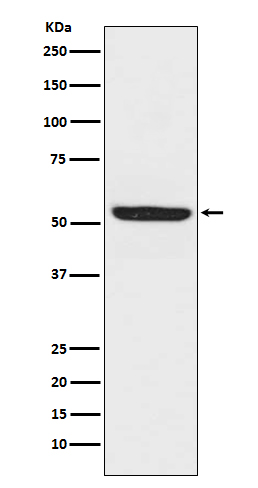
| WB | 咨询技术 | Human,Mouse,Rat |
| IF | 咨询技术 | Human,Mouse,Rat |
| IHC | 咨询技术 | Human,Mouse,Rat |
| ICC | 技术咨询 | Human,Mouse,Rat |
| FCM | 1/20-1/100 | Human,Mouse,Rat |
| Elisa | 咨询技术 | Human,Mouse,Rat |
| Aliases | SK1; Sphingosine kinase 1; SPHK; Sphk1; SPK;;SK 1 |
| WB Predicted band size | Calculated MW: 43 kDa ; Observed MW: 51 kDa |
| Host/Isotype | Rabbit IgG |
| Antibody Type | Primary antibody |
| Storage | Store at 4°C short term. Aliquot and store at -20°C long term. Avoid freeze/thaw cycles. |
| Species Reactivity | Human,Mouse,Rat |
| Immunogen | A synthesized peptide derived from human SK 1 |
| Formulation | Purified antibody in PBS with 0.05% sodium azide,0.05% BSA and 50% glycerol. |
+ +
以下是关于SPHK1抗体的3篇文献示例,包含文献名称、作者及摘要概括:
1. **文献名称**:*Sphingosine kinase 1 is overexpressed and promotes proliferation in human thyroid cancer*
**作者**:Sukocheva, O. 等
**摘要**:研究通过免疫组化和Western blot使用SPHK1抗体,发现甲状腺癌组织中SPHK1高表达,并与细胞增殖和生存相关,提示其作为潜在治疗靶点。
2. **文献名称**:*Role of sphingosine kinase 1 in LPS-induced proinflammatory responses in human macrophages*
**作者**:Pettus, B.J. 等
**摘要**:利用SPHK1特异性抗体抑制酶活性,发现SPHK1通过调控S1P生成促进巨噬细胞炎症反应,参与脓毒症等炎症疾病机制。
3. **文献名称**:*Targeting sphingosine kinase 1 inhibits Akt signaling, induces apoptosis, and suppresses tumor growth in glioblastoma*
**作者**:Neubauer, H.A. 等
**摘要**:通过SPHK1抗体及抑制剂实验,证明抑制SPHK1可阻断胶质母细胞瘤中Akt通路,诱导凋亡并抑制肿瘤生长,为靶向治疗提供依据。
以上文献均通过SPHK1抗体探索其在疾病模型中的表达、定位或功能机制。
The SPHK1 (sphingosine kinase 1) antibody is a research tool designed to detect and study the sphingosine kinase 1 enzyme, a key regulator of sphingolipid metabolism. SPHK1 catalyzes the phosphorylation of sphingosine to produce sphingosine-1-phosphate (S1P), a bioactive lipid mediator involved in diverse cellular processes, including cell proliferation, survival, migration, and immune response modulation. Dysregulation of SPHK1/S1P signaling has been implicated in pathologies such as cancer, inflammation, and metabolic disorders, making SPHK1 a target for therapeutic development.
SPHK1 antibodies are widely used in techniques like Western blotting, immunohistochemistry, and immunofluorescence to assess protein expression, localization, and activity in tissues or cultured cells. These antibodies help researchers investigate SPHK1's role in disease mechanisms, such as tumor progression (via promoting angiogenesis and metastasis) or inflammatory conditions (by regulating immune cell trafficking). Monoclonal and polyclonal variants are available, often raised in hosts like rabbits or mice, with validation for specificity and cross-reactivity. Recent studies also explore SPHK1's potential as a biomarker or drug target, driving demand for reliable antibodies to support preclinical and diagnostic research.
×